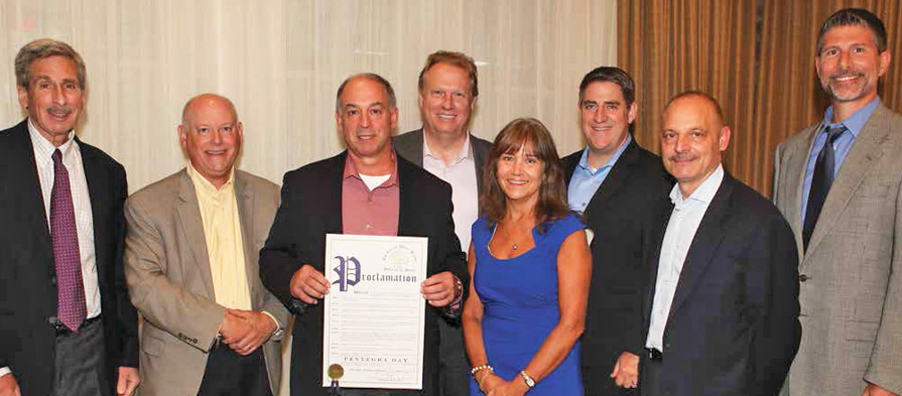To say that strategies for saving for retirement have changed over the past 75 years would be a major understatement. But it”™s a challenge that Pentegra, the provider of retirement plan, fiduciary outsourcing and institutional investment products, has been able to meet since its birth in 1943.
“One thing that”™s remained constant is the way we cater to our client base,” said John Pinto, CEO and president of the company since 2013. “We”™ve always been able to provide innovative products and change with the marketplace to meet the needs of different types of clients.”
In 1943, employees in the U.S. could rely on their company pension to see them through their golden years, usually augmented by the Social Security program, then just eight years old.
Today, of course, the picture is very different. The employer-funded pension or defined benefit plan has gone by the wayside in most industries, with a shift toward the defined contribution plan like the 401(k), where the employee is largely responsible for building his or her nest egg (augmented in many cases by the employer, which can provide “matching” funds depending on varying formulae and situations).
Navigating those and other changes successfully has been key to the success of Pentegra, whose corporate headquarters is in White Plains with another office in Shelton. “We have evolved tremendously,” affirmed First Senior Vice President, General Counsel and Corporate Secretary Robert Alin, who, having joined Pentegra in 1986, is its longest-serving employee.
“When I started here we essentially had just two products ”” a multiple employer-defined benefit pension program (MEP) and a tax-exempt trustee savings plan for employees of financial institutions and organizations,” Alin continued. “We were only allowed to work with financial institutions then because of Department of Labor regulations.”

The privately owned firm ”” which started life with the pithy name Retirement Fund of the Federal Home Loan Bank System ”” was founded by that system in 1943 to administer a defined benefit pension trust, the Savings Associations Retirement Fund, for its employees. It took the name Pentegra ”” a combination of “pensions” and “integrity” ”” in 1993.
The change came about after a concerted effort “that took a couple years to get off the ground” to receive IRS approval to grow its product line to include single-employer retirement plans, Alin said. It also received permission to expand the marketing of its programs and services beyond the financial community to businesses across different industries and sectors on a national basis.
“We had a contest” to come up with the new moniker, Alin said. “Originally we thought it would be called ”˜Integra,”™ but there was an automobile that was popular at the time with that name, so we didn”™t want to have to deal with that confusion.” (The Honda Integra was introduced to the U.S. in the mid-1980s, but was discontinued in 2006.)
Assets under management (AUM), which had topped $500 million by the end of the 1970s, reached over $2 billion by the end of the ”˜90s. With the new millennium, Pentegra grew further with some key acquisitions, including subsidiaries of Retirement System Group Inc.; full-service, third-party retirement plan administration and recordkeeping firm Alliance Benefit Group-Carolinas; and Advanced Pension Solutions Inc., a full-service, third-party retirement plan administration firm based in Ohio.
Those moves, Pinto said, have helped Pentegra diversify both geographically and in terms of the products and services it offers.
The firm now has over $13 billion in AUM, nearly double its $7.5 billion in AUM at the end of the last decade, he said. “We”™ve expanded our product line significantly, and we”™ve built the fiduciary expertise that helps give us a competitive advantage.”
The company claims a 98 percent client retention rate, as well as more than 100 clients who have been with it for at least 30 years. Pentegra further bills itself as one of the largest and most experienced MEP providers in the country. Those tax-qualified retirement plans, wherein two or more unrelated employers participate, can be particularly attractive to small businesses that are otherwise unlikely to provide retirement benefits in the face of expensive startup costs and burdensome administrative responsibilities.
Pinto said that one thing that has unfortunately not changed is Americans”™ failure to save enough for retirement. A report earlier this year by the Harvard Business Review found that, among Americans aged 40 to 45, “the median retirement account balance is $14,500 ”” less than 4 percent of what the median-income worker will require in savings to meet his retirement needs.”
And the Social Security safety net that many assume will see them through their retirement ”” never intended to fund all of one”™s golden years in the first place ”” has also been widely reported to be in danger. For the first time since 1982, Social Security”™s total costs are expected to exceed its income this year. The latest annual report by Social Security’s trustees estimates that, if no changes are made, the system will be paying most but not all promised benefits by 2034, when it essentially will run out of money.
“I tell everybody I meet, no matter what business they”™re in, to save early and save often” for their retirement, Pinto said. “And they should try to increase their contribution (to a retirement fund) by 1 percent a year, every single year. It doesn”™t impact your paycheck that much, and it obviously can add up over time.”
Taking full advantage of an employer”™s 401(k) matching funds ”” or, if there is no employer plan, investing in alternative vehicles like IRAs or Roth IRAs ”” is also of paramount importance, Pinto added. “Retirement comes a lot more quickly than most people think,” he said.
As for shepherding Pentegra to its 100th anniversary and beyond, Pinto said the mantra will remain the same: Putting ”” and servicing ”” the client”™s needs first.
“That”™s one thing that definitely hasn”™t changed,” he said. “Any of our clients can pick up the phone and talk to me or any of our senior team members. It”™s a practice that”™s embedded in our heritage.”




















